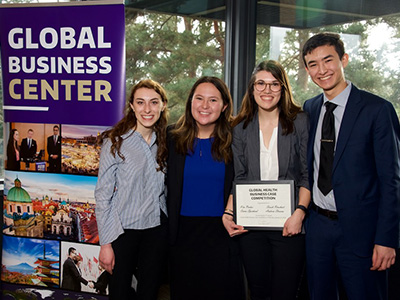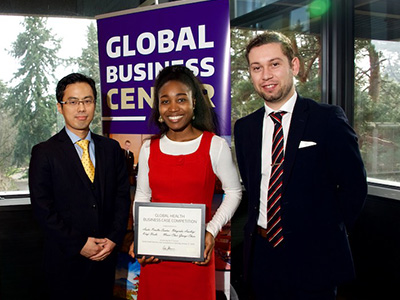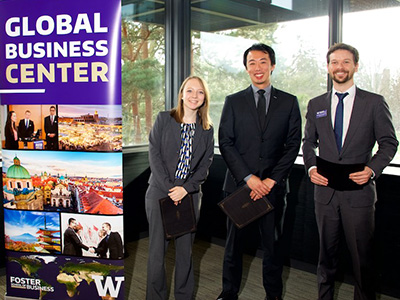Six students from the UW School of Public Health placed among the top teams in the Global Health Business Case Competition last month, where they pitched a tool to help get life-saving vaccines to children in hard-to-reach communities.

Sarah Rinehart and Emma Spickard, juniors in the Public Health Major, were part of the undergraduate team that took home first place. They worked with Kim Perdue and Andrew Stearns, both studying business, on the project. Teams enrolled in the UW-wide case competition had to be interdisciplinary.
Additionally, Marie-Claire Gwayi-Chore and André Peralta-Santos, doctoral students in the Department of Global Health, won first place among graduate-student teams, while Kayla Lowe and Wilson Trang, from the Master of Health Administration program, took home second place.
Nearly two dozen undergraduates and graduate students from SPH took part in the third annual case competition (see below for full list), hosted by the Foster School of Business’ Global Business Center, the Jackson School’s Center for Global Studies and our Department of Global Health (uniquely positioned between SPH and the School of Medicine).

According to a story from the Global Business Center, the competition “offers students an opportunity to work across disciplines on a global health problem important to the Seattle and UW global health communities.”
On Jan. 25, 31 teams (25 undergraduate teams and six graduate teams) had to make a case to the Pan American Health Organization (PAHO) that vaccine vial monitors should be required on newer vaccines, such as those used against hepatitis B, mumps, rubella, influenza, yellow fever and the human papilloma virus (HPV). While creating the pitch, students had to consider, among other things, the burden of various diseases in the country and the health care infrastructure, particularly the vaccine supply chain.

Getting life-saving vaccines to children in hard-to-reach parts of Africa and Asia is a major global health concern. Vaccines must stay cool during transport, yet it's not always possible to prevent heat exposure. What's more, historically, health workers have had no means of determining whether vaccines were damaged by heat. Vaccine vial monitors are small temperature monitors that adhere to a vaccine vial to indicate whether the medicine has been rendered ineffective by excessive heat exposure.
Teams of students were asked to take on the role of a joint team of managers from TempTime, the main manufacturer of the vaccine vial monitor, and representatives from UNICEF. The judges acted as members of PAHO. Students had just 24 hours to do their research and create the slide deck to accompany their presentation. Pitches were presented on Jan. 27.
In addition to the 2018 case winners, competition participants included Alyssa Bosold (MCH), Ashmi Chakraborty (PHM), Grace Chao (PHM), Na Young "Jenny" Chung (PHM), Kassandra Franco (PHM), Roshan Khatri (GH), Joshua Klett (PHM), Brendon Krall (PHM), Judy Lee (MHA), Wenting Liu (PHM), Hannah Markus (PHM), Kari Morohashi (MHA), Grace Stephenson (GH Minor), Christina Sun (GH), Wilson Trang (MHA) and John Weitnauer (MHA).
